Chaos erupted in Ghana’s Parliament on August 13, 2024, as the Minority attempted to halt the vetting of two Supreme Court nominees put forward by President Nana Akufo-Addo.

The incident unfolded at the Appointments Committee, where Justice Sophia Bernasko Essah and Professor Richard Frimpong Oppong were scheduled to be vetted for their potential appointments to the country’s highest court.
The disruption began even before the vetting process could commence, with concerns raised about the constitutionality of the appointments. Mahama Ayariga, the National Democratic Congress (NDC) Member of Parliament for Bawku Central, spearheaded the opposition, arguing that the nominations were unconstitutional.
Ayariga stated, “I think that we have been doing an illegal thing, an unconstitutional thing.
The president has been exercising the power without any foundation in the constitution or any law that I know.”
He specifically cited Articles 128, 144, 296, and 298 of the Ghanaian Constitution to support his objection.

The MP’s intervention highlighted a potential conflict between executive power and constitutional provisions, raising questions about the process of judicial appointments in Ghana.
This challenge to the nominations underscores the ongoing tensions between the ruling party and the opposition in matters of governance and constitutional interpretation.
In response to the Minority’s objections, Majority Leader Alexander Afenyo-Markin defended the vetting process.
He emphasized that the role of the Appointments Committee is strictly limited to considering and vetting the President’s nominations, not to determine their constitutionality.
“We are only to vet and report to the preliminary for a decision to be taken.
We are not determining whether we are going to take a matter under a certificate of agency which will be determined by a committee,” Afenyo-Markin asserted.
This clash between the Minority and Majority factions highlights the complex interplay between executive appointments, legislative oversight, and constitutional interpretation in Ghana’s democratic system.
It also raises broader questions about the separation of powers and the checks and balances within the country’s governance structure.
As the situation continues to unfold, it remains to be seen how this constitutional dispute will be resolved and what impact it may have on the appointment process for Supreme Court justices in Ghana.
The outcome of this confrontation could potentially set a precedent for future judicial nominations and the role of parliamentary oversight in such matters.
The incident has drawn significant attention from legal experts, political analysts, and the public, reflecting the importance of judicial appointments in shaping the country’s legal landscape and the intense scrutiny such nominations face in Ghana’s vibrant democracy.
Source: myjoyonline.com



